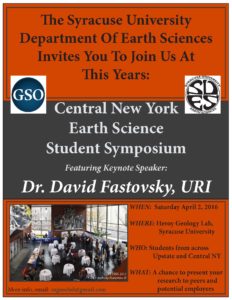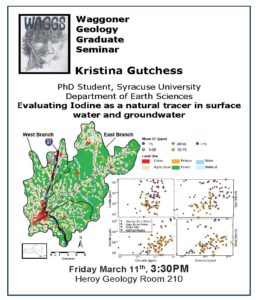On Friday, April 1, Sherburne Abbott presented a seminar titled “Loops, Lags, and Limits of Climate Science and Policy” to Earth science, civil and environmental engineering, and geography students and faculty. Sherburne Abbott is currently the Vice President for Sustainability Initiatives and Professor of Sustainability Science and Policy at Syracuse University. Previously, she served as the Associate Director for Environment of the Office of Science and Technology Policy in the Executive Office of President Obama (2009-2011), the Director of the Center for Science and Practice of Sustainability in the Office of the Executive Vice President and Provost at the University of Texas at Austin, and the Chief International Officer of the American Association for the Advancement of Science.
Ms. Abbott’s presentation explored the current state of climate science, including both public and scientific perceptions of the issue. She emphasized that the climate is already undeniably changing with impacts manifested in recent extreme events. She discussed the implications if we don’t take immediate action to mitigate greenhouse gas emissions and adapt to climate change. Nevertheless, she expressed hope that the Paris Climate Talks would forge the path forward both domestically and internationally to curb greenhouse gas emissions. “Climate change is a tough public policy problem,” said Abbott, “due to its global nature, the challenge of collective action, multigenerationality, and the linkage of greenhouse gas emissions with the economy.” At the end of the presentation, she discussed the need for scientists and policy makers to work together to bring about effective measures to address climate change.
News submitted by Emily Baker, Jacqueline Gerson, and Alex Johnson

